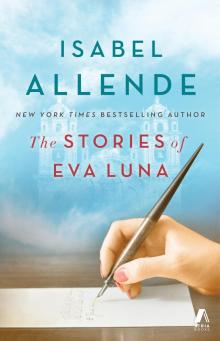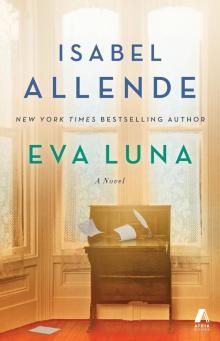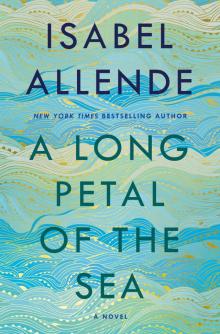- Home
- Isabel Allende
Ines of My Soul Page 5
Ines of My Soul Read online
Page 5
It was impossible to describe the vast space of those places, the endless green of the jungles, the numbers of crystalline rivers, the depths of the lakes of calm waters, the opulence of the gold and silver mines. There a man could dream, not so much of treasure as of glory, he said; he could live a full life, combat savages, fulfill a higher destiny, and, with God’s favor, found a dynasty. That and more was possible on the new frontiers of that empire, where there were birds with jewel-like feathers and naked, complaisant women the color of honey—“Begging your pardon, Doña Marina, that is merely a manner of speaking.” There were not enough words in the Spanish tongue to describe the bounty of those lands: pearls as big as partridge eggs, gold that fell from the trees, and so much land, and Indians to work it, that any ordinary soldier could become the master of a king-granted hacienda the size of a Spanish province. Most important of all, he added, were all the peoples awaiting the word of the One True God and the gifts of our Spanish civilization. He added that Francisco de Aguirre, the friend they had in common, definitely wanted to go. In fact, his thirst for adventure was so great that he was prepared to leave his beloved wife and the five children she had given him in that same number of years.
“And do you believe there are still opportunities in that Terra Nova for men like us? It has been forty-three years since Colón landed, and twenty-six since Cortés conquered Mexico,” Valdivia pointed out.
“And also twenty-six since Magellan set out to navigate the globe, Pedro. As you see, the earth is growing larger, the opportunities are infinite. It is not only the New World that is open to exploration, there is Africa as well, and India and the Philippine Islands, and much, much more,” young Alderete insisted.
He repeated what was being talked about in every corner of Spain: the conquest of Peru and the extravagant treasures to be found there. A few years before, two soldiers no one had ever heard of, Francisco Pizarro and Diego de Almagro, had joined in the adventure of pushing forward to Peru. Defying Homeric perils on land and sea, they had made two voyages, starting from Panama and advancing along the ragged coastline of the Pacific, with no maps, feeling their way, heading south, always south. They were guided by rumors from Indians of several tribes who told of a place where cooking utensils and tools were crusted with emeralds, where the streams ran with liquid silver, and where beetles and tree leaves were living gold. Since they had no accurate idea of where they were, they had to anchor and leave their ships to explore land never before trod by a European. Many Spaniards died along the way, and others survived by eating snakes and insects.
On the third voyage, which Diego de Almagro did not participate in because he was recruiting soldiers and raising funds for another ship, Pizarro and his men finally reached the territory of the Incas. Walking dead, fatigued and sweating, wanderers strayed from sea and sky, the Spaniards debarked from their battered ships to find themselves in a benign land of fertile valleys and majestic mountains, very different from the noxious jungles farther north. They were sixty-two ragged, filthy cavalry and one hundred and six exhausted foot soldiers. They set out cautiously, clad in their heavy armor, cross in the lead, harquebuses loaded, and swords bared. They were met by a wood-colored people who dressed in colorful woven garments and spoke a language of sweet vowels. They were frightened because they had never seen anything like those bearded beings that were half man and half beast. The surprise must have been equally great on both sides, since the Spaniards had not expected to find a civilized people. They were astounded by the works of architecture and engineering, the textiles and jewels.
The Inca Atahualpa, the sovereign of that empire, along with thousands of his court, was at the time enjoying the curative waters of some hot springs, camped in a luxury comparable to that of Suleiman the Magnificent. One of Pizarro’s captains went there to invite him to meet with the Spanish adventurers. The Inca, surrounded by his retinue, received him in a white tent decorated with flowers and fruit trees planted in pots of precious metals set amid the warm-water pools in which hundreds of princesses and swarms of children splashed and played. The Inca was hidden by a curtain, following the tradition that no one could look upon his face, but curiosity overcame protocol, and Atahualpa had the curtain removed so that he could observe the bearded stranger more closely.
The captain found himself facing a still-young monarch with agreeable features, seated on a throne of pure gold beneath a canopy of parrot feathers. Despite the strange circumstances, a flicker of mutual liking sparked between the Spanish soldier and the noble Quechua. Atahualpa offered the small group of visitors a banquet served on vessels of silver and gold inset with amethysts and emeralds. The Spaniard conveyed Pizarro’s invitation to the Inca, secretly distressed, knowing that he would be leading the Inca ruler into a trap, the usual ruse of conquistadors. Within only hours he had come to respect the Incas, who were more civilized than many peoples in Europe. Amazed, he learned that they had an advanced knowledge of astronomy and had devised a solar calendar, that they had taken a census of the millions of inhabitants of their extensive empire, and that they commanded an efficiently run social and military organization. There were, however, strange omissions: they did not have a system of writing, their weapons were primitive, they did not use the wheel, and they did not have animals for riding or for labor—only a few delicate sheep with long legs and the eyes of a bride, which they called llamas. They worshipped the Sun, which demanded human sacrifices only during times of tragedies, such as an illness of the Inca or a defeat in war, when it became necessary to placate their god with offerings of virgins or children. Deceived by false promises of friendship, the Inca and his large court traveled without weapons to the city of Cajamarca, where Pizarro had set up the ambush. The Inca traveled in a gold palanquin carried on a platform by his ministers, and followed by his seraglio of beautiful maidens. After the Spanish killed the courtiers who had tried to protect him with their bodies, Atahualpa was taken prisoner.
“Peru’s treasures are all anyone is talking about. It has spread like a fever, and infected half of Spain. Is it true what they say?” Valdivia asked.
“It is true, even though it sounds incredible. In exchange for his freedom, the Inca offered Pizarro all the gold that could be contained in a room twenty-two feet long, seventeen feet wide, and nine feet high.”
“That’s an impossible sum!”
“It is the highest ransom in history. It was paid in jewels, statues, and vessels, but it was melted down and turned into bars marked with the royal seal. And it was all for nothing that Atahualpa’s subjects, like diligent ants, brought that fortune from every corner of the empire, because after Pizarro had kept the Inca a prisoner for nine months, he condemned him to be burned alive anyway. At the last hour, in exchange for the Inca’s agreeing to be baptized, Atahualpa had his sentence commuted to a less horrible death: the infamous garrote,” Alderete explained. He added that Pizarro believed he had good reason for what he did, since supposedly the captive had instigated an uprising from his cell. According to Pizarro’s spies, there were two hundred thousand Quechuas on the way from Quito, along with thirty thousand Caribs—who were known to eat human flesh—all of them intending to engage the conquistadors at Cajamarca, but the Inca’s death forced them to change their plan. Later it was learned that such an enormous army of insurgents had never existed.
“Whatever the case, Jerónimo, it is difficult to explain how a handful of Spaniards were able to defeat the advanced civilization you describe. And take control of a territory larger than Europe,” said Pedro de Valdivia.
“It was a vast empire, but it was fragile and young. When Pizarro arrived, it had existed only a century. Furthermore, the Incas were real voluptuaries; they did not have a chance against our courage, our weapons, and our horses.”
“I suppose that Pizarro aligned himself with the Inca’s enemies, the way Hernán Cortés did in Mexico.”
“He did. Atahualpa and his brother Huáscar were waging a fratricidal war, and firs
t Pizarro, and then Almagro, who arrived in Peru a little later, took advantage of that to defeat them both.”
Alderete explained that not a leaf stirred in the Inca empire that the authorities did not learn about; the ordinary Indians were all slaves. The Inca used part of the tribute paid him by his subjects to feed and protect orphans, widows, the ancient, and the ill, and also put part aside for bad times. In spite of these advanced social laws, which did not exist in Spain, the people detested the sovereign and his privileged court because they lived only to serve the military and religious castes, the orejones. According to Alderete, it didn’t matter to the people whether they were dominated by Incas or Spaniards, and that is why they didn’t offer much resistance to the invaders. In any case, Atahualpa’s death gave the victory to Pizarro. When the head was cut off the body of the empire, the empire collapsed.
“Those two men, Pizarro and Almagro, bastards both of them, with neither education nor fortune, are a perfect example of what can be achieved in the New World, Pedro. They are not just wealthy beyond imagination, they have also had honors and titles heaped on their heads by our emperor.”
“You hear only about their fame and their wealth, only about the ventures that succeeded: gold, pearls, emeralds, lands, and subjected Indians. No one ever mentions the dangers,” Valdivia argued.
“You are right about that; there is no end to the dangers. It takes men of great character to conquer those virgin soils.”
Valdivia blushed. Did Alderete have doubts about his character? But immediately he reasoned that if that were the case, the man was within his rights, since he himself had wondered. It had been a long while since he had put his courage to the test. The world was moving ahead with giant steps. It was his fate to have been born into a splendid age in which the mysteries of the universe were at last being revealed: not only was the earth round, there were those who suggested that it circled the sun and not the reverse. And what was he doing while all this was happening? He was counting sheep and goats, harvesting cork and olives. Once again Valdivia was aware of how bored he was. He was tired of tending cattle and tilling fields, of playing cards with his neighbors, of masses and rosaries, of reading the same books over and over—nearly all of them banned by the Inquisition—and of several years of obligatory, sterile embraces with his wife. Here before him stood destiny, embodied in that enthusiastic young man, come once more to knock at his door, as it had in the times of Lombardy, Flanders, Pavía, Milan, and Rome.
“When are you leaving for the Americas, Jerónimo?”
“This year, if God wills it.”
“You can count on me,” said Pedro de Valdivia in a whisper, so Marina wouldn’t hear. His eyes were on the Toledo sword hanging above the fireplace.
In 1537 I said my good-byes to my family, whom I would never see again, and traveled with my niece Constanza to the beautiful city of Seville, perfumed with orange blossoms and jasmine, and from there down the clear waters of the Guadalquivir to the bustling port of Cadiz, with its narrow cobbled streets and Moorish cupolas. We set sail on Maestro Manuel Martín’s ship, a three-master with a tonnage of two hundred and forty, slow and heavy but steady in the water. A line of men loaded on the cargo: barrels of water, beer, wine, and oil; sacks of flour and dried meat, live fowl, a cow, and two pigs to be eaten on the voyage, in addition to several horses, which were worth their weight in gold in the New World. I watched while my carefully tied bundles were delivered to the space Maestro Martín had assigned me.
The first thing I did as my niece and I settled into our small cabin was to set up an altar to Nuestra Señora del Socorro, the Lady of Perpetual Succor.
“You are very courageous to undertake this voyage, Señora Inés. Where will your husband be waiting?” Manuel Martín asked.
“In truth, I do not know, Maestro.”
“What! He will not be waiting in Nueva Granada?”
“The last letter he sent came from a place they call Coro, in Venezuela, but that was some while ago, and it may be that he is no longer there.”
“The Americas are a territory larger than all the rest of the known world. It will not be easy to find your husband.”
“Then I shall look until I find him.”
“And how will you do that, señora?”
“The usual way, by asking.”
“Then I wish you luck. This is the first time I have carried women. I beseech you, you and your niece, to be prudent,” the maestro added.
“What do you mean by that?”
“You are both young, and not at all bad looking. You must know what I am referring to. After a week at sea, the men begin to long for female companionship, and as you two are right here onboard, the temptation will be very strong. And another thing. Sailors believe that women aboard ship attract storms and other misfortunes. For your well-being, and my peace of mind, I would prefer that you and your niece have no dealings with my men.”
The maestro was a stocky Galician with broad shoulders and short legs, a prominent nose, little rodent eyes, and skin weathered like saddle leather by the salt and wind of his years at sea. He had signed on as a cabin boy when he was thirteen, and could count on the fingers of one hand the years that he had spent on terra firma. His rough appearance contrasted with the gentleness of his manners and the goodness of his heart, which would be evident later when he came to my aid at a moment of great need.
It is a shame that I did not yet know how to write, otherwise I would have begun to take notes. Although I did not suspect that my life would be worth telling about, that voyage should have been noted down in detail, since so few people have crossed the salty ocean expanse: lead-colored water teeming with secret life, neverending, terrifying, all foam, wind, and solitude. In this relation, written many years after the events it describes, I hope to be as meticulous as possible, but memory is always capricious, the fruit of all one has lived, desired, and fantasized. The line that divides reality from imagination is very thin, and at my age is no longer interesting, for now everything is subjective. Memory is also colored by vanity. Even with Death sitting in a chair near my table, waiting, I still am influenced by vanity, not just when I rouge my cheeks if visitors are coming, but when I am writing my story. Is there anything more vain than an autobiography?
I had never seen the ocean, and had thought of it as a very wide river, never imagining that I would not be able to see the other shore. I refrained from making comments, in order not to give evidence of my ignorance, and I hid the fear that froze my bones when the ship sailed into open waters and began to pitch and heave. There were seven of us passengers, and all of them, except for Constanza, who had a very strong stomach, were almost immediately seasick. So great was my misery that on the second day I begged Maestro Martín to allow me to take a boat and row back to Spain. He burst out laughing and forced a pint of rum down my throat, which had the virtue of transporting me to another world for thirty hours, at the end of which I revived, sunken cheeked and green. It was only then that I could sip the broth my sweet niece spooned into my mouth.
We had left terra firma behind, and were sailing through dark waters beneath an infinite sky, without shelter of any sort. I could not imagine how the pilot could know where he was in that never-changing vastness, with nothing to guide him but his astrolabe and the stars in the firmament. He assured me that I could rest easy, for he had made the voyage many times and the route was well known to Spaniards and Portuguese, who had been following it for decades. Navigation charts were no longer as closely guarded as they once had been; even the damned English had them now. He made it clear that it was a different matter when it came to charts of the Strait of Magellan, or the Pacific coast. Pilots guarded those with their lives; they were more valuable than any New World treasure.
I never grew used to the motion of the waves, the creaking wood, the grating iron, the incessant flapping of wind-whipped sails. By day I was tormented by the crowded conditions and, especially, the way the men stared at me with the eyes
of dogs in heat. I had to fight for my turn to place our olla on the cookstove, as well as for privacy to use the latrine, a large box outfitted with a hole and suspended over the ocean. Constanza, in contrast, never complained, and even seemed content. After a month at sea, supplies began to grow scarce, and water, by now fouled, was rationed. Because the men stole the eggs, I moved the cage with my hens to our cabin, and took them outside twice a day with a string around their legs, like lapdogs being taken for a stroll.
On one occasion I had to use my frying pan to defend myself from a sailor more brash than the others, a certain Sebastián Romero, whose name I have never forgotten because I know we will meet again in purgatory. In the close quarters of the ship, this man seized the slightest excuse to fall against me, blaming it on the waves. I warned him again and again to leave me alone, but that merely excited him further. One night he found me alone in the small area beneath the bridge that served as a kitchen. Before he could get his hands on me, I felt his fetid breath on the nape of my neck and, without thinking twice, I half-turned and thumped him on the head with the frying pan, exactly as I had years ago to poor Juan de Málaga when he threatened to strike me. Sebastián Romero had a softer skull than Juan, and fell sprawling to the deck, where he lay for several minutes as if asleep, while I searched for rags to bandage his head. He did not lose as much blood as one might have expected, though later his face did swell and turn the color of an eggplant. I helped him to his feet, and since neither of us was eager to spread the truth about his injury, we agreed to say that he had banged his head against a beam.

 The Stories of Eva Luna
The Stories of Eva Luna The House of the Spirits
The House of the Spirits Paula
Paula Ines of My Soul
Ines of My Soul Of Love and Shadows
Of Love and Shadows Kingdom of the Golden Dragon
Kingdom of the Golden Dragon Daughter of Fortune
Daughter of Fortune City of the Beasts
City of the Beasts Maya's Notebook
Maya's Notebook Eva Luna
Eva Luna Zorro
Zorro In the Midst of Winter
In the Midst of Winter Forest of the Pygmies
Forest of the Pygmies My Invented Country: A Nostalgic Journey Through Chile
My Invented Country: A Nostalgic Journey Through Chile The Japanese Lover
The Japanese Lover Portrait in Sepia
Portrait in Sepia Island Beneath the Sea
Island Beneath the Sea The Soul of a Woman
The Soul of a Woman A Long Petal of the Sea
A Long Petal of the Sea Ines of My Soul: A Novel
Ines of My Soul: A Novel The Sum of Our Days
The Sum of Our Days